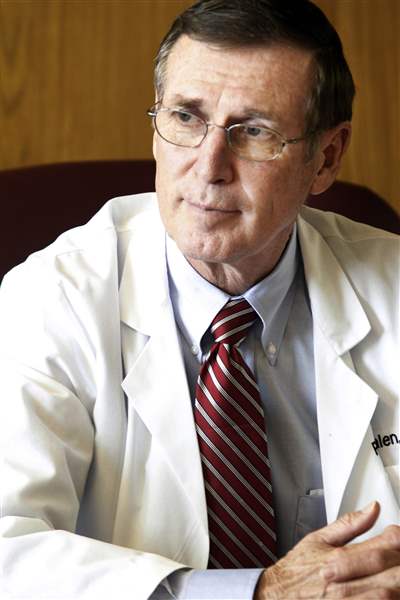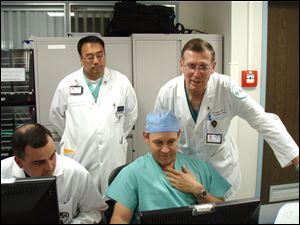
VOLUNTEER PROGRAM
Toledo surgeon treats wounded warriors overseas
Vascular specialist spent 2 weeks at Army hospital in Germany
6/12/2011
“Once you’re there, it’s tough to say ‘I’m done,’” says Dr. Ralph Whalen of Toledo Hospital.
The Blade/Amy E. Voigt
Buy This Image

“Once you’re there, it’s tough to say ‘I’m done,’” says Dr. Ralph Whalen of Toledo Hospital.
Dr. Ralph Whalen never served in the military, but the Toledo vascular surgeon goes overseas to aid injured U.S. warriors.
And wounds the 63-year-old Neapolis native has seen from improvised explosive devices and other bombs while volunteering at the largest American hospital overseas are different from those he would have treated if drafted during the Vietnam War. Protective equipment and medical treatment are different too, with more soldiers injured in Iraq and Afghanistan having their limbs and even lives saved.
“I’ve seen some significant injuries from these bombs that go off and IEDs that blast our soldiers,” Dr. Whalen said. “Sometimes we’ll see abdominal injuries, but [injured] extremities are more common.”
Dr. Whalen recently returned from a two-week volunteer stint at the U.S. Army’s Landstuhl Regional Medical Center in Germany, where he treated American soldiers wounded in Iraq and Afghanistan. The Jobst Vascular Institute surgeon’s first two-week volunteer experience at Landstuhl was last spring, and he plans to return next spring to provide his expertise caring for veins and arteries along with other medical duties.
“Once you’re there, it’s tough to say ‘I’m done,’” Dr. Whalen said last week. “You feel like you’re making a contribution.”
He added: “It’s a great experience. It’s very gratifying, very rewarding without a doubt.”
As wars continue, military vascular surgeons — including those who have done some graduate medical education training in Toledo — are in short supply. Many are deployed to field hospitals in Iraq and Afghanistan, where they treat and stabilize wounded soldiers, who then are sent to Landstuhl before going back to the United States, Dr. Whalen said.
Members of the Society for Vascular Surgery were asked to volunteer at Landstuhl, and Dr. Whalen is among 72 who have answered the call since 2007. They work alongside military medical personnel and other volunteers, including trauma surgeons also doing two-week rotations.
A fellow vascular surgeon, Dr. Anthony Comerota, the Jobst Vascular Institute director, is among those who have gone to Landstuhl. He volunteered for two weeks last August, and he is working on arranging another rotation.
“The severity of the injuries that we see are absolutely heart-wrenching,” said Dr. Comerota, adding that nails, ball bearings, and other items put into improvised explosive devices cause severe damage. “These IEDs have changed the course of the war.”
Another Jobst Vascular Institute physician, Dr. Steven Gale, is planning to volunteer at Landstuhl in January. Unlike Dr. Comerota and Dr. Whalen, Dr. Gale is a military veteran, having served in the infantry during Vietnam before medical school.
Dedication from volunteers helps the military provide soldiers with the best care possible, according to a statement from the military hospital.

Dr. Ralph Whalen, far right, a vascular surgeon at Toledo Hospital’s Jobst Vascular Institute, joins military trauma surgeons at Landstuhl Regional Medical Center in Germany during his two-week stint.
“That’s the area where your vascular surgery skills can be applied at a higher level,” Dr. Comerota said.
Some of those military doctors on the front lines, meanwhile, are familiar with Toledo.
For nearly two decades, Walter Reed Army Medical Center in Washington has sent its vascular surgery fellow to Jobst Vascular Institute and Toledo Hospital for a two-month rotation every year. Jobst and Toledo Hospital also have two of their own vascular surgery fellowships.
Drs. Comerota and Whalen praised military medical personnel who treat soldiers on the front lines before sending them to Landstuhl, as well as the doctors, nurses, and other staff at the 24-bed hospital in Germany. Government contractors also are treated at Landstuhl, and all patients are there no more than five days before being transported to the United States, Dr. Whalen said.
Dr. Whalen said patients have been very grateful for his help.
“Every one of these soldiers is so committed,” he said. “Their biggest concern, no matter how bad their injury is, is how their buddy is doing.”
Contact Julie M. McKinnon at: jmckinnon@theblade.com or 419-724-6087.